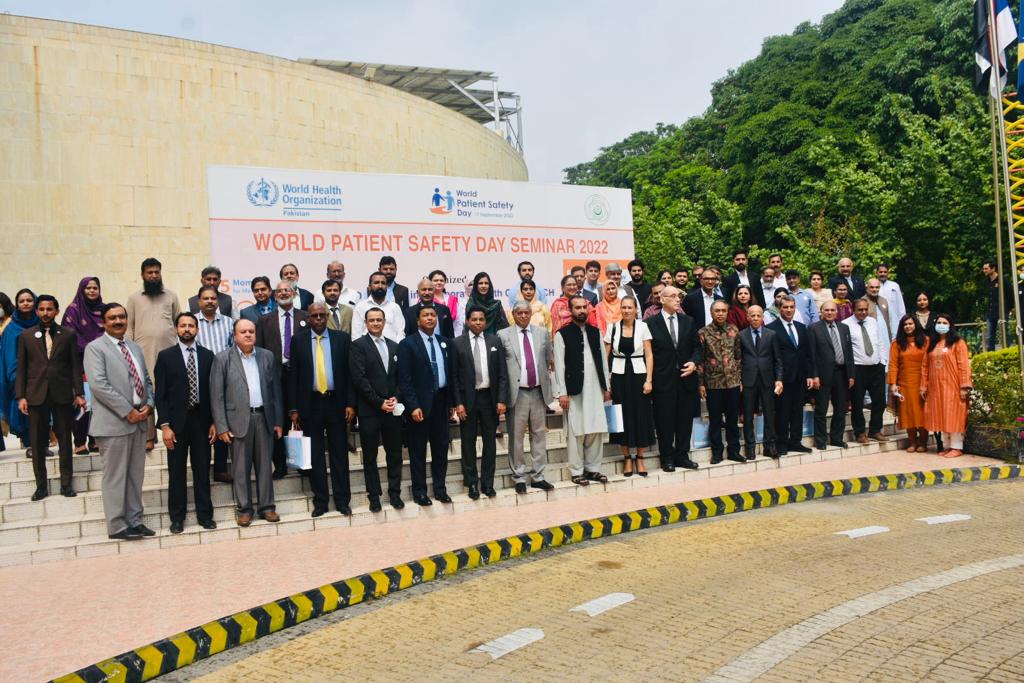WHO and COMSTECH celebrates World Patient Safety Day

WHO and COMSTECH celebrates World Patient Safety Day.
Islamabad, Sept. 16: World Health Organization in collaboration with COMSTECH celebrated “World Patient Safety Day” under the slogan of “Medication without Harm” at COMSTECH Auditorium on Friday.
World Patient Safety Day is marked annually on 17 September. It aims to raise awareness on how to prevent, reduce risks, errors, and harm that occur to patients during the provision of health care.
In keynote address, Dr. Palitha Mahipala, Head of Mission/WHO Representative to Pakistan said that WHO’s vision is to ensure that every patient receives safe and respectful care, every time, everywhere.
He said, around 134 million adverse events happen in hospitals due to unsafe healthcare practices. Out of which estimated 2.6 million patients die annually. The social cost of patient harm is estimated to be US$ 1 – 2 trillion a year. He said that the theme of this year’s commemoration is “Medication Safety” which addresses a critical component of safety in health care.
Dr. Mahipala said that unsafe medication practices and errors are a leading cause of injury and avoidable harm in health care systems across the world. He mentioned that globally the cost associated with medication errors has been estimated at $42 billion annually. He informed that the most harm arises from systems failures in the way care is organized and coordinated, especially when multiple health providers are involved in a patient’s care.
Dr. Mahipala said, in Pakistan, a small research study on Patient Safety & adverse events conducted in 2021 in 5 hospitals throughout the country, which found that diagnostic errors comprise 40%, while surgical or procedure-related errors comprise 32% error, complications of childbirth-15%, adverse medication-related events 9%, and healthcare-associated infection or pneumonia 4% of all adverse effects.
He said that WHO has called 2020-2030 a decade of patient safety. He informed that WHO Pakistan in collaboration with the federal ministry of health & provincial departments of health is taking concrete steps to accelerate medication safety and improve the quality of care in Pakistan. He reiterated that WHO Pakistan stands committed to support the Government of Pakistan to ensure safe healthcare practice at all levels.
Dr. Mahipala said that the humanitarian crisis caused by recent floods in Pakistan, we are extremely concerned that the health gains of the past few years are at increased risk of collapse. We’re working closely with the Government of Pakistan and the Ministry of National Health Services Regulations and Coordination to mobilize resources to respond to this massive humanitarian crisis including providing urgent healthcare to the patients.
Prof. Dr. Muhammad Iqbal Choudhary, Coordinator General, COMSTECH said that we are delighted to partner with the WHO not only for this event, but we plan to work together for the common mission of improved health. He said that World Patient Safety Day calls for global solidarity and concerted action by all countries and international partners to improve patient safety.
Prof. Choudhary said that hardly anyone among you can claim that you have not experienced the bad effect of certain medication. Some of these effects are due to the non-specificity of medication and often unavoidable, but a large majority of these harmful effects are due to improper prescription, drug-food interaction and certain non-compliance.
Prof. Choudhary said that multidrug resistance in pathogenic agents, cancer cells, etc. are largely associated with the improper use of antibiotics and anti-virals.
He mentioned that many of us use medications for chronic illnesses such as diabetes, hypertension, etc. In such cases, cumulative harmful effects of medication kills patients before the actual disease cause mortality.
Prof. Choudhary said in the OIC countries, population increase, lack of access to quality health care including pharmacy services, weak control on the sale of prescribed medicines, illiteracy, and poverty are major impediments in the safe use of medication as well causes of prevailing harmful effects.
Prof. Choudhary said that Organization of Islamic Cooperation (OIC) is the second largest political block of countries after UN. OIC and UN enjoys very cordial and fruitful collaboration in the health care sector and we at OIC are especially pleased that our member states played a positive role in not only saving the WHO but also strengthening this important global institution at a critical time of need.
Director General Health, Dr. Shabana Saleem, Ministry of National Health Services, Regulation and Coordination said that the Director General of WHO, Tedros Ghebreyesus, noted in a recent press conference that the 2022 world patient safety day celebrated every year and is focused on medication without harm. According to him medication errors account for half of all avoidable harm in medical care.
She said the major contributing factors to unsafe practices are weak medication systems and human factors, with many countries lacking the capacity to detect, evaluate and prevent medicine safety issues.
She said the aims to reduce severe avoidable medication related harm by 50% would be achieved through focused activities and interventions targeting three areas: patients and the public, health care professions, and medicine system and medication practices. She mentioned that we are working with the provincial governments, AJ&K and GB to implement the WHO’ global patient safety action plan 2021-2030. The national patient safety strategy and road map are currently being developed.
The Ambassadors of Lebanon, Afghanistan, Somalia, Indonesia, Azerbaijan, Cyprus, Morocco, Sudan, participated in the celebration of World Patient Safety Day.


